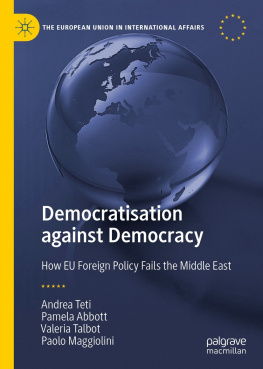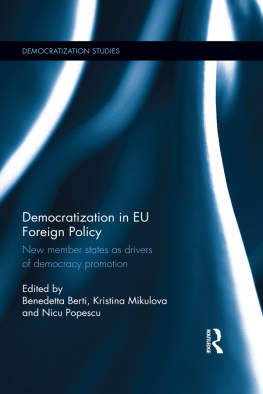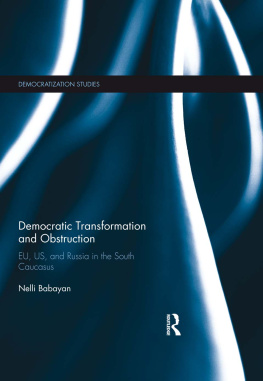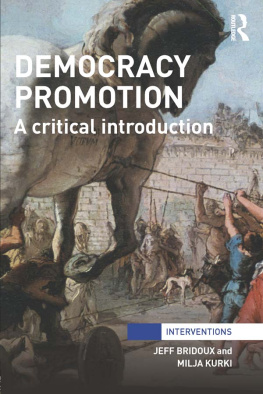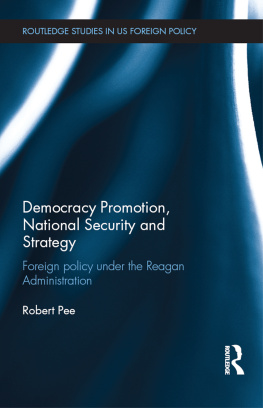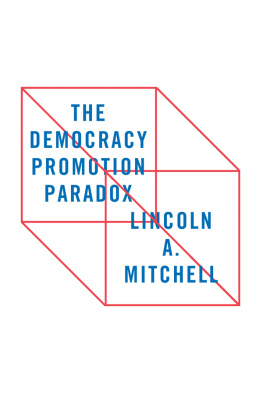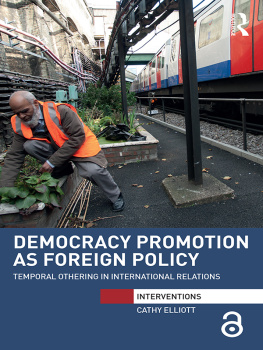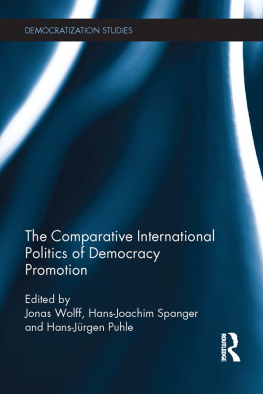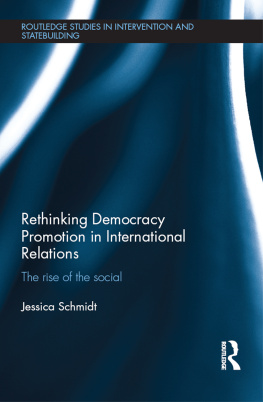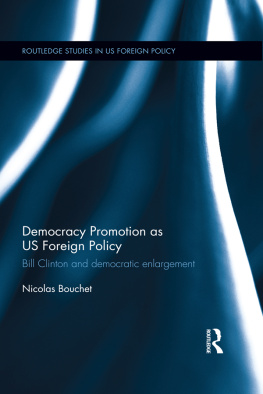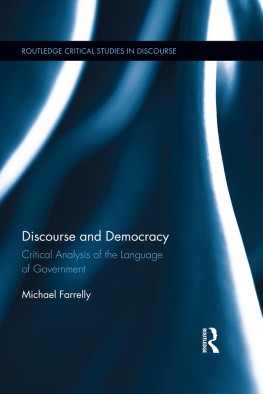The Author(s) 2020
A. Teti et al. Democratisation against Democracy The European Union in International Affairs https://doi.org/10.1007/978-3-030-33883-1_10
10. Conclusions: Learning from Listening? Why the EU Failed to Learn from the Arab Uprisings and Why that Matters
Andrea Teti
(1)
School of Social Sciences, University of Aberdeen, Aberdeen, UK
(2)
School of Education, University of Aberdeen, Aberdeen, UK
(3)
MENA Centre, Italian Institute of International Political Studies, Milan, Italy
(4)
Catholic University of Milan, Milano, Milano, Italy
Andrea Teti (Corresponding author)
Email:
Keywords
European Union Democracy Development Gender Human rights Public opinion
In this book we have shown why the EUs claim to be a normative actor in the Southern Mediterranean does not stand up to the evidence and have explained how and why EU democracy promotion fails in the region. It fails because the EU promotes the wrong kind of democracy and the wrong strategies for economic growthwrong both in the sense that these approaches do not work in this context and in the sense that they are not what people want. This double failure highlights a paradox of EU democracy promotion: while nominally an emancipatory endeavour, in practice it undermines those very emancipatory transitions to democracy and to inclusive development which it claims to pursue. In detailing these failures, we have compared conceptions of gender, democracy and human rights . The limits of EU policy, both in theory and in practice, match up precisely with the areas which Southern Mediterranean Countries (SMCs) citizens consider priorities and in which they wish to see both their own governments and the EU intervene. It is this mismatchshown in detail in the contrast between the first and second halves of the bookand the failure to address it seriously which continues to erode the EUs reputation in the region and continues to constrain the effectiveness of its policies. The gap between the EUs image of itself and of what people in the region want on the one hand and populations actual desires on the other explains negative perceptions of the EU, why the Unions normative power and its regional influence are undermined and how the EUs own narratives make regional populations the Other , open them up to narrowly conceived securitisation and thus legitimate the EUs interventions to normalise them. This gap has serious consequences not only as an obstacle to achieving the EUs own objectives in the region as well as Arab peoples own preferences but also inasmuch as it sustains the structural tensions which continue to drive instability, insecurity and migration in the region.
The book began by tracing the evolution of the EUs self-image as a normative powerwhat it sees as good and successful in its own creation which should be exported as the model of society to which others should aspire. Our analysis showed that while the EC /EUs history has been driven by regional economic integration and Keynesian macroeconomics, its contemporary narrative about achieving peace and prosperity in postWorld War II Europe draws heavily on narrowly conceived, procedural democratic valueseschewing socioeconomic rights and social justice and on development driven by market liberalisation.
This construction of the EUs own identity has several consequences, one of which is the culturalisation of democracy andconsequentlyof its promotion. With this shift, democracy becomes more about the presence or absence of fundamental valuesthose very same values which are set out in the Lisbon Treaty , which also mandates the Union to promote them in international affairsand more about the willingness of individual people or countries to adopt those values, and less about the political institutions, the rights and the economic policies designed to both give people political representation and afford them the possibility of exercising their rights in practice. In turn, this culturalisation of democracy provides fertile terrain for viewing EU-Middle Eastern relations through a renewed Orientalist lens, of conceiving the export of democracy almost as a kind of latter-day mission civilisatrice and at the very least responsibilising the Arab Other for the lack of democracy in the region, and thus placing the blame for the failure of democracy, of development or indeed of security on those Others while ignoring the international political context which is so crucial in supporting authoritarian regimes resilience to popular demands (for a discussion of the implications for Democratisation Studies, see Teti ). Another correlate of the EUs self-image is the centrality and normalisation of market democratisation in both its domestic and external policy design and practice, of which several chapters have noted aspects.
In particular, after the Cold War, the collapse of the USSR and the supposed triumph of liberal democracy , the EU envisaged a Euro-Mediterranean Partnership (European Commission : 2) intended to create a zone of peace and prosperity built on democracy, good governance and human rights with the ultimate aim of ensuring Europes security. While adding to its nascent claim to a normative external action and focus on democracy, this policy was also intended to pursue earlier foreign policy aims in relation to energy security, migration and political violence. Political and economic reforms were intended to absorb pressures from Arab states high level of unemployment and large youth populations. The 1995 Barcelona Conference formally launched the Euro-Mediterranean Partnership (EMP). The Barcelona Process aimed to promote economic and political liberalisation in the belief that these would facilitate democratisation in Mediterranean Partner Countries (MPCs) through political dialogue both at the state level and directly with civil society organizations (CSOs). To achieve its objectives, the EMP was structured around political, economic and cultural baskets and adopted parallel pathways to integration: vertical integration between the EU and MPCs and horizontal integration between the MPCs themselves. The neoliberal economic strategies which the EU promoted did stimulate growth but also mostly benefited the EU and increased inequality. In addition, in principle Association Agreements democratic conditionality allowed the EU to both reward positive progress on democratisation and apply punitive measuresfrom suspending aid to cutting off relations to freezing the Agreement itselfif partners fell short, but in practice the EU never implemented such sanctions. Instead it prioritised short-term, narrowly conceived stability over long-term security, de facto propping up autocrats distrusted and disliked by their populations, while South Mediterranean governments opposed direct EU engagement with civil society and rejected pressure for democratisation.
Chapter traced the roots, rationales and evolution of the EUs pre-Uprisings external relations in its Southern Neighbourhood, examining the discursive structure of EU policies in the run-up to Arab Uprisings in three key areas: democracy, development and delivery. The EUs conception of democracy was shown to be narrowly procedural (focusing on elections, civil-political rights) while paying scant attention to difficult civil-political rights (association, protest) or indeed to social and economic rights. Pre-Uprisings policy also aimed for sustainable and inclusive growth through economic liberalisation, combining political and economic reform in a single model of market democratisation. Finally, conditionality was presented as the EUs main instrument for leveraging progress on human rights and democracy, and while pre-Uprisings delivery was framed in terms of both positive and negative conditionality , in practice, as noted above, the latter was used exceedingly rarely. The EUs external relations with its Southern Partners have faced broadly similar challenges since the 1990s, and indeed earlier, in its aim to create an area of democracy and shared prosperity which it sees as requiring reforms which lead to both political and economic inclusion, which the EU sees as the ingredients of long-term stability, prosperity and peace.

